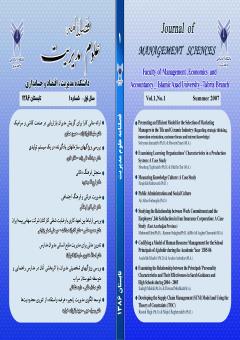Studying the Relationship between Work Commitment and the Employees' Job Satisfaction in Iran Insurance Corporation: A Case Study (East Azarbaijan Province)
Subject Areas : Business ManagementMahmod Elmi 1 * , KAMRAND Sedagat 2 , Mirali Asghar Chavoshi 3
1 - Assistant Professor and Faculty Member of Sociology Department, Tabriz Branch, Islamic Azad University, Tabriz, Iran
2 - Assistant Professor, Azarbaijan Teacher Training University
3 - Master of Science (MSc) in Public Administration
Keywords: job satisfacation, Job commitment, Work Commitment,
Abstract :
One of the major problems of our society in accessing cultural, ecomical, and social development is the lowness of work conscience, or work commitment, among a considerable part of the country's employees. This has been addressed as a social problem since lack of work commitment exists as an actual reality (way of behavior) that has been put forward by the officials especially those who maintain the social values, as a social problem that can be solved. On the other hand, enquiry into the place of the power of work commitment within the conceptual hierarchy of the employees and understanding the mechanisms of its effectiveness are the necessary first step in any planning and executing suitable policies to promote work commitment. It seems that creating, reinforcing, and accelerating work commitment will have numerous positive results in the different areas of society. Therefore, this research aims to study the relationship between work commitment and the job satisfaction of the employees of Iran Insurance Company in EastAzarbaijanProvince. The research method is correlational survey, and it is cross-sectional from the view point of time. The research population consists of 55 employees of Iran Insurance Company in EastAzarbaijanProvince. Data collection was carried out using field research and filling out questionnaires, and Likert Scale was used to measure the job satisfaction and work commitment.
sChalabi, M. (1996). Sociology of Order. Tehran: Ney Publication, (In Persian).
Gruneberg, M. M. (1979). Understanding job satisfaction. London: Mac Millan.
Hexis Hubert, J. (1997). Theories of Organization and Management. Translated by: G., Kohan, Tehran: Agah Publishing, (In Persian).
Locke, E. A. (1980). The nature and causes of job satisfaction in the public sector. Journal of social Issues.
Mashbaki, A. (1997). Commitment of Conscience and Administrative Transformation. Hamshahri Newspaper, 1446, (In Persian).
Mirsepasy, N. (1995). Labor Law, Work Consciousness and Work Culture. Tadbir Journal, 11-17, (In Persian).
Nayeli, A. (1994). Motivation in Organizations. Ahwaz: Shahid Chamran University Publishing, (In Persian).
Rajabzadeh, A. (1997). Values and Weakness of Conscience in Iran. Research Letter, 5, 61-73, (In Persian).
Sedaghat, K. (2000). Surveying the Conscientiousness of Hospital Workers in Tabriz Hospitals affiliated to Tabriz University of Medical Sciences, (In Persian).
Soltani, I. (1996). Employee Conscience Measurement Test. Tadbir Journal, 79, (In Persian).
_||_
Chalabi, M. (1996). Sociology of Order. Tehran: Ney Publication, (In Persian).
Gruneberg, M. M. (1979). Understanding job satisfaction. London: Mac Millan.
Hexis Hubert, J. (1997). Theories of Organization and Management. Translated by: G., Kohan, Tehran: Agah Publishing, (In Persian).
Locke, E. A. (1980). The nature and causes of job satisfaction in the public sector. Journal of social Issues.
Mashbaki, A. (1997). Commitment of Conscience and Administrative Transformation. Hamshahri Newspaper, 1446, (In Persian).
Mirsepasy, N. (1995). Labor Law, Work Consciousness and Work Culture. Tadbir Journal, 11-17, (In Persian).
Nayeli, A. (1994). Motivation in Organizations. Ahwaz: Shahid Chamran University Publishing, (In Persian).
Rajabzadeh, A. (1997). Values and Weakness of Conscience in Iran. Research Letter, 5, 61-73, (In Persian).
Sedaghat, K. (2000). Surveying the Conscientiousness of Hospital Workers in Tabriz Hospitals affiliated to Tabriz University of Medical Sciences, (In Persian).
Soltani, I. (1996). Employee Conscience Measurement Test. Tadbir Journal, 79, (In Persian).

